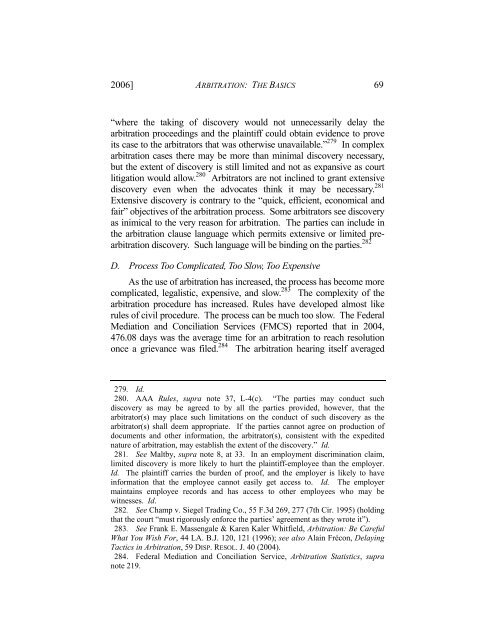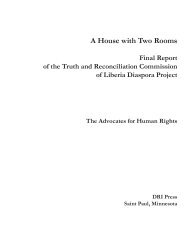2006/Vol. 5 No.1 - Hamline Law - Hamline University
2006/Vol. 5 No.1 - Hamline Law - Hamline University
2006/Vol. 5 No.1 - Hamline Law - Hamline University
Create successful ePaper yourself
Turn your PDF publications into a flip-book with our unique Google optimized e-Paper software.
<strong>2006</strong>] ARBITRATION: THE BASICS 69<br />
“where the taking of discovery would not unnecessarily delay the<br />
arbitration proceedings and the plaintiff could obtain evidence to prove<br />
its case to the arbitrators that was otherwise unavailable.” 279 In complex<br />
arbitration cases there may be more than minimal discovery necessary,<br />
but the extent of discovery is still limited and not as expansive as court<br />
litigation would allow. 280 Arbitrators are not inclined to grant extensive<br />
discovery even when the advocates think it may be necessary. 281<br />
Extensive discovery is contrary to the “quick, efficient, economical and<br />
fair” objectives of the arbitration process. Some arbitrators see discovery<br />
as inimical to the very reason for arbitration. The parties can include in<br />
the arbitration clause language which permits extensive or limited prearbitration<br />
discovery. Such language will be binding on the parties. 282<br />
D. Process Too Complicated, Too Slow, Too Expensive<br />
As the use of arbitration has increased, the process has become more<br />
complicated, legalistic, expensive, and slow. 283 The complexity of the<br />
arbitration procedure has increased. Rules have developed almost like<br />
rules of civil procedure. The process can be much too slow. The Federal<br />
Mediation and Conciliation Services (FMCS) reported that in 2004,<br />
476.08 days was the average time for an arbitration to reach resolution<br />
once a grievance was filed. 284 The arbitration hearing itself averaged<br />
279. Id.<br />
280. AAA Rules, supra note 37, L-4(c). “The parties may conduct such<br />
discovery as may be agreed to by all the parties provided, however, that the<br />
arbitrator(s) may place such limitations on the conduct of such discovery as the<br />
arbitrator(s) shall deem appropriate. If the parties cannot agree on production of<br />
documents and other information, the arbitrator(s), consistent with the expedited<br />
nature of arbitration, may establish the extent of the discovery.” Id.<br />
281. See Maltby, supra note 8, at 33. In an employment discrimination claim,<br />
limited discovery is more likely to hurt the plaintiff-employee than the employer.<br />
Id. The plaintiff carries the burden of proof, and the employer is likely to have<br />
information that the employee cannot easily get access to. Id. The employer<br />
maintains employee records and has access to other employees who may be<br />
witnesses. Id.<br />
282. See Champ v. Siegel Trading Co., 55 F.3d 269, 277 (7th Cir. 1995) (holding<br />
that the court “must rigorously enforce the parties’ agreement as they wrote it”).<br />
283. See Frank E. Massengale & Karen Kaler Whitfield, Arbitration: Be Careful<br />
What You Wish For, 44 LA. B.J. 120, 121 (1996); see also Alain Frécon, Delaying<br />
Tactics in Arbitration, 59 DISP. RESOL. J. 40 (2004).<br />
284. Federal Mediation and Conciliation Service, Arbitration Statistics, supra<br />
note 219.
















